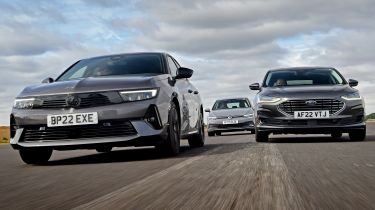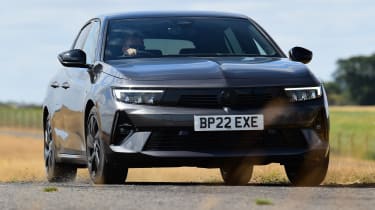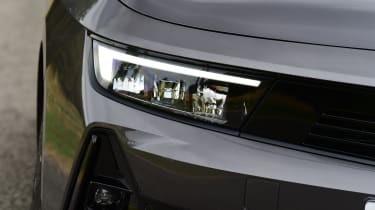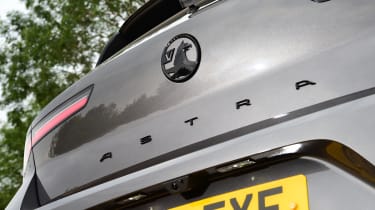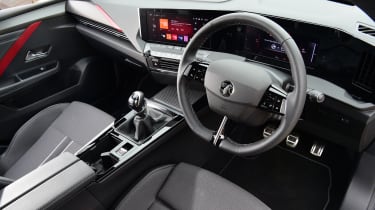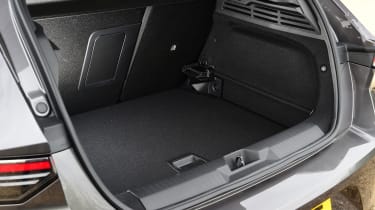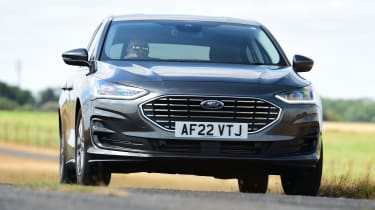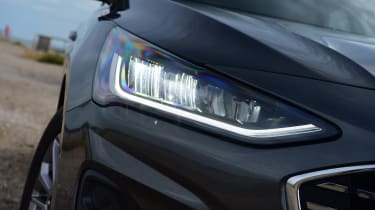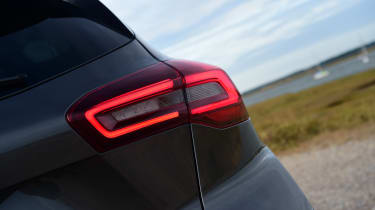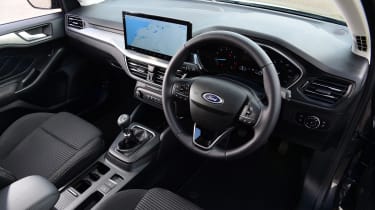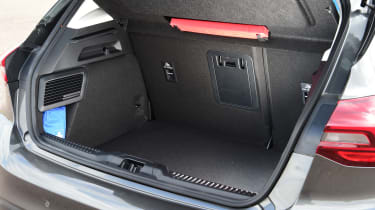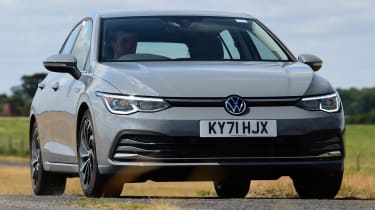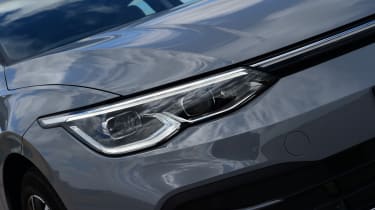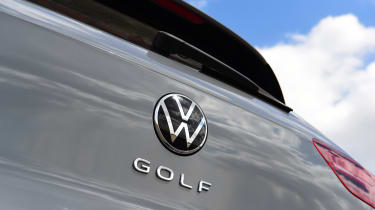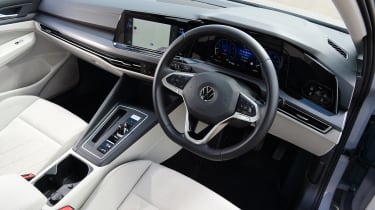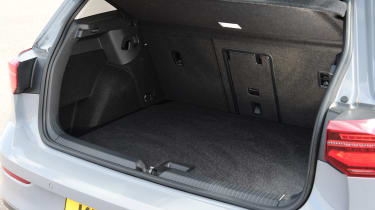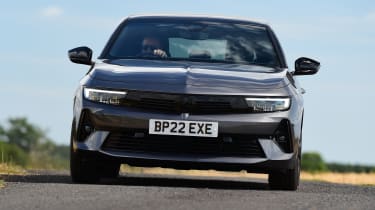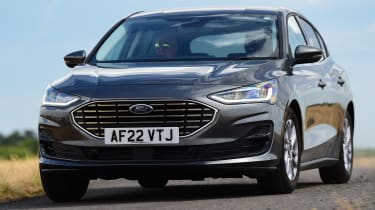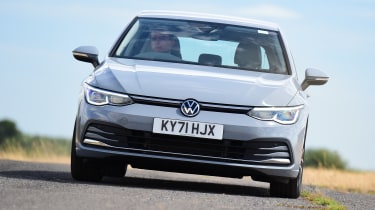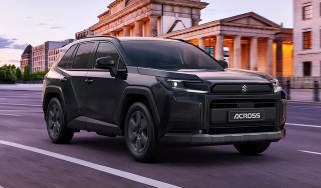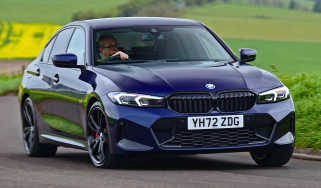Vauxhall Astra vs Ford Focus vs Volkswagen Golf: 2022 group test review
Vauxhall’s all-new Astra locks horns with old rivals, the Ford Focus and Volkswagen Golf, in our hatchback shootout
There was a time when the family hatch was the backbone of Britain. Sensible, affordable models such as the Vauxhall Astra, Ford Focus and Volkswagen Golf were the default choice for most buyers. Add in practicality and there was little reason why anyone would choose to buy anything else.
Indeed, between 2005 and 2007, the Focus and Astra were the UK’s two biggest-selling new cars, with the VW consistently lurking just a couple of places behind.
Today, the rise of the SUV means that just the Golf is still in the UK top 10 list of new-car registrations, and only in ninth spot. The Ford and the Vauxhall have long since slipped away. But are buyers wrong to move away from these cars? Do they still offer the same all-round ability they once did?
Well, there’s an all-new Astra on the scene, which Vauxhall hopes will see it clamber back towards the top – both in terms of the sales rankings, but also to challenge the best models in the class.
We’ve put the latest version up against its two oldest foes, the Golf, now in Mk8 form, and the Focus, in its new-for-2022 Mk4 facelift guise, to find out.
Vauxhall Astra
| Model: | Vauxhall Astra 1.2 Turbo GS Line |
| Price: | £27,210 |
| Engine: | 1.2-litre 3cyl turbo, 129bhp |
| 0-62mph: | 9.7 seconds |
| Test economy: | 47.0mpg/10.3mpl |
| CO2: | 130g/km |
| Annual road tax: | £165 |
This is the eighth generation of the Vauxhall Astra and it marks a radical development for the brand’s family hatchback in terms of design and the engineering under the skin. We’re testing the mid-spec 1.2 Turbo GS Line model (predicted to be the biggest seller), which costs £27,210.
Used - available now

2026 BMW
Z4
13,450 milesAutomaticPetrol2.0L
Cash £29,990
2022 Volvo
XC40
37,000 milesAutomaticPetrol1.5L
Cash £19,850
2023 Nissan
Juke
16,200 milesAutomaticPetrol1.6L
Cash £16,625
2023 MG
ZS EV
39,000 milesAutomaticElectric
Cash £13,620Design & engineering
With Vauxhall part of the Stellantis group, this all-new Astra uses the same EMP2 platform as sister brand Peugeot’s 308. This multi-energy architecture allows for plug-in hybrid power, while a full-electric Astra will arrive next year. But it’s the more affordable pure-petrol 1.2-litre three-cylinder turbo model we’re testing here.
This engine produces 129bhp and 230Nm of torque. Given its prevalence across Stellantis group cars, it’s a known quantity, combining strong performance and economy but leaving better refinement to be desired. It’s linked to a six-speed manual gearbox that drives the front wheels.
The car uses MacPherson-strut suspension up front and a torsion beam axle at the rear, and Vauxhall has focused on tweaking the Astra’s steering, suspension damper tuning and bump stops, as well as the anti-roll bars to focus on a sportier feel and more high-speed stability.
There are some lightweight components, such as the thermoplastic boot, which help to reduce weight and boost handling and efficiency, too. This new material has also allowed the Astra’s angular design, particularly from the rear, where there are many similarities to the latest VW Golf.
At the front the car features Vauxhall’s trademark Vizor grille while inside, the firm’s Pure Panel infotainment is standard and joined by ergonomic seats and mostly decent materials. While there are some hard plastics in conspicuous areas, on the whole, quality is okay but not class-leading. Still, the Golf is not as good in this area as it used to be.
Driving
In the first 50 yards it’s easy to tell Vauxhall has focused on sportier settings for the Astra’s chassis, and it works. The steering is light and precise, while the body control is solid. It means the Astra feels genuinely good to drive, and even fun on some occasions. It’s still not quite as engaging as the Focus, but the Astra is now as close as it ever has been dynamically to its rival, which is an achievement.
While the engine isn’t the greatest unit, it delivers adequate performance and more than enough flexibility, thanks to its low-down slug of torque. The six-speed manual gearbox is fine, too – not a weak point nor a highlight – and makes the car easy to drive around town. The shift action is positive enough, but not the last word in precision.
The slight downside of the car’s sportier tuning is that the Astra does feel taut on the road. The firmer set-up doesn’t unduly impact ride comfort, but the Vauxhall’s chassis does pick-up more bumps and imperfections than the Golf’s suspension. Still, it’s relatively well controlled and the dampers do their best to smooth out most surfaces, so the resulting compromise highlights some positives in the Astra’s chassis tuning and the level of comfort and refinement on offer is relatively good.
On this latter point, all Astras feature a special noise-reducing windscreen, so on the motorway the car is quiet, and at low revs under light load the engine is refined. It only starts to get a little grumbly when you accelerate hard, which doesn’t yield the greatest performance anyway.
Practicality
When it comes to passenger space, the Astra isn’t a class leader. Beside the Golf, it’s reasonably competitive; rear kneeroom is ever so slightly less – the deeply sculpted backs to the front seats help here. But compared with the Focus, there’s noticeably less space.
Plenty of room for feet is found under the front seats, though, and the central hump in the floor is much lower in the Vauxhall than it is in the Volkswagen. All three models are very evenly matched for headroom.
There are lots of storage points inside, with a huge lidded cubbyhole between the front seats, cup-holders behind the gearlever, and a larger, lidded tray in front of it, plus a fold-out panel below the central air vent for sunglasses. The only downside is that the door bins, although deep and high-sided, aren’t carpeted like they are in both the Focus and the Golf, so items tend to rattle about more.
Rear visibility is fine despite the Astra’s sharp looks, while GS Line models feature a reversing camera as standard anyway. This mid-spec model also has an ergonomic driver’s seat that’s certified by AGR, the Campaign for Healthier Backs in Germany, and it is comfortable over long distances.
Ownership
Safety organisation Euro NCAP awarded the Vauxhall Astra four stars in its assessment. While the Focus and the Golf achieved five stars, they were tested in 2018 and 2019 respectively.
With NCAP’s testing regimes becoming more stringent every two years, the Astra has been assessed to higher standards. All Astras come with eight airbags, lane-departure warning, cruise control and speed limit sign recognition.
Running costs
Depreciation has a big financial influence over the choice for any private car buyers, and in this area, the Astra falls just a little bit short of its two test rivals.
Over three years or 36,000 miles, it’s expected to hold on to 48.7 per cent of its original value, compared with 51.4 per cent for the Golf, and 52.3 per cent for the Focus. In monetary terms, that means the Astra will lose just under £14,000 of its original value, the Golf will drop by £13,500 and the Focus will shed £12,850.
Tester’s notes: “The Astra’s IntelliLux headlights are made up of 168 LED units, which can switch individually to maximise light without dazzling other road users.”
Ford Focus
| Model: | Ford Focus 1.0 EcoBoost 125 Titanium Vignale |
| Price: | £28,840 |
| Powertrain: | 1.0-litre 3cyl turbo, 123bhp |
| 0-62mph: | 10.2 seconds |
| Test economy: | 44.6mpg/9.8mpl |
| CO2: | 123g/km |
| Annual road tax: | £155 |
While the Focus shown in our pictures is the Titanium trim, we’re testing it against its rivals here as the higher-spec Titanium Vignale, which is the closest match on price. It starts from £26,950, slightly undercutting the Astra. Options fitted here that are still cost extras on the Titanium Vignale include the grey Magnetic paint (£725), Driver Assist Pack (adding traffic-sign recognition, adaptive cruise control and auto high beam for £525) and the Parking Pack (a £500 option that adds park assist, a rear view camera, and door edge protectors).
Design & engineering
The Astra faces an even tougher task in this contest, because the Focus has recently benefited from a mid-life refresh. Cosmetic changes mainly take place at the front, where a new set of headlights straddle a fresh grille design. It now features the Blue Oval logo at its centre; the previous Focus placed it on the leading edge of the bonnet. Subtly reprofiled tail-lights, plus new wheel and colour options, round out the changes.
Inside, a key revision comes in the form of Ford’s latest SYNC 4 infotainment system, it’s a vast improvement over the previous set-up. Little else has changed. The cabin quality is only okay; none of these cars top the class in this area – look to the Skoda Octavia or the Peugeot 308 if that matters most to you – but even in this company, a slightly plain layout and too many cheap-feeling plastics mean that the Focus impresses the least.
Under the bonnet, the Focus soldiers on with Ford’s 1.0-litre EcoBoost engine. Like the Astra’s motor, it has three cylinders and a turbocharger – although more potent variants have now been equipped with mild-hybrid power that helps to reduce load on the engine and save a little fuel as a result.
The Focus is now one of few competitors in this segment not to share its underpinnings with any other manufacturer, which offers the potential for a unique feel beside the competition here.
Driving
It might have been around for longer than either of its rivals, but the Ford’s chassis still feels the most sophisticated here. There aren’t many everyday family hatchbacks that are fun to drive, but the Focus certainly sits at the top of the pile. It feels agile yet predictable when turning into corners, there’s loads of grip, and the steering has a linear, responsive weighting.
Taken at face value, these traits won’t necessarily sound vital for many family car buyers, but they mean the Ford delivers a feeling that you don’t get from its rivals – and peace of mind that it’ll respond accurately when you need it to.
Most impressive of all is that, despite this sharpness, there’s little in the way of compromise when it comes to comfort. It is marginally the firmest of this trio over bumps, but it never jars or throws its occupants about. Wind and road noise are slightly more audible than in the Astra at higher speeds, but the levels of refinement are still more than good enough.
If there’s one area in which the Focus is starting to show its age, it’s the powertrain. The 1.0-litre EcoBoost engine is the smallest here, which means that before the turbo chimes in, it feels a little lethargic. If you want to pull out of a junction, you will need to set a few more revs than you might initially think is acceptable – if you don’t, it’ll crawl away from the line and eventually surge forward when the boost arrives. The three-cylinder motor also transmits more vibration into the cabin than either of its rivals here. At least the six-speed manual gearbox is slick in its operation.
Practicality
Ford’s trump card here is its rear passenger room. In this company, it’s the most spacious choice; even taller adults won’t have much to grumble about in the back. It’s also the best for a third passenger because the centre hump in the floor is low, so obstructs feet the least, and the middle seat is the softest here.
The job of installing a child seat is also made easiest in the Focus, thanks to it having the largest rear doors and all that space. The Isofix brackets are also really easy to get to behind removable plastic covers. The Golf’s fixing points are great, too – they’re covered by hinged plastic doors – but the Astra’s are behind small zips, so they are much more fiddly to reach than the others here.
The Ford’s boot lacks the twin-level floor of its rivals, but like the other two, it comes with a couple of bag hooks, and a ski hatch for carrying longer items while allowing a pair of passengers to continue using the outer two rear seats.
Ownership
None of these three manufacturers covered themselves in glory in our latest Driver Power owner satisfaction survey, with Ford faring the worst of the three.
Of the 29 included brands, Ford took a disappointing 25th overall; Volkswagen and Vauxhall weren’t too far ahead, taking 18th and 19th respectively. Vauxhall owners experienced the fewest faults of those three, with 16 per cent reporting an issue of any sort, compared with 19 per cent of VW drivers and 21 per cent of Ford’s customers.
Running costs
Company car users will swing towards plug-in hybrid or fully electric models because of the tax benefits they bring. Unfortunately, Ford doesn’t offer a model with a plug in this class – PHEV versions of the Astra and Golf present more tempting solutions.
Of these specific models, there is little to separate the trio on Benefit in Kind; all sit in the 29 per cent category and a standard-rate taxpayer will face annual deductions of £1,564 (Vauxhall), £1,549 (Ford) and £1,596 (VW)
Volkswagen Golf
| Model: | Volkswagen Golf 1.5 TSI 130 Style |
| Price: | £27,765 |
| Powertrain: | 1.5-litre 4cyl turbo, 128bhp |
| 0-62mph: | 9.2 seconds |
| Test economy: | 44.3mpg/9.7mpl* *mpg/mpl for automatic mild-hybrid |
| CO2: | 124g/km |
| Annual road tax: | £155 |
In terms of trim level, Style is the Golf model that most closely matches the Astra and the Focus. The model pictured is a 1.5 TSI with a DSG auto gearbox; we’re comparing it here as a manual, which at £27,765, is the priciest car on test.
Design & engineering
When Volkswagen introduced the Mk8 Golf back in 2019, it had big shoes to fill. Its predecessor was a car with very few flaws, so how could the latest version improve?
VW’s solution was to introduce new tech; more safety systems, updated powertrains and a new cabin infotainment system all graced the new car.
New doesn’t necessarily mean better, of course. While the new exterior styling, which brought in sharper headlights on a lower nose, is largely successful, we’re far from convinced about the new cabin ergonomics. Two touch panels – one to the right of the driver for lighting controls; another in the centre of the dash for key comfort and infotainment shortcuts – leave the driver environment looking much clearer and uncluttered, but are a little fiddly to use.
Worst of all are the temperature and volume controls, which are operated by sliding or tapping your finger across a touch-sensitive panel, placed right where you’d choose to steady your hand when using the infotainment set-up. Compared with the old Golf, which was almost flawless ergonomically, it’s a big step back and hard enough to use when you’re at a standstill, let alone on the move. It’s also the most frustrating set-up of this trio.
On the plus side, the Volkswagen’s driving position is excellent and there’s a wide range of adjustment in both the seat and the steering wheel.
Under the skin, the specs show some promise. The trusty 1.5-litre turbocharged petrol engine is the only four-cylinder car in this company, and its peak torque of 200Nm is 30Nm more than its rivals’.
Driving
Where the Ford is the default choice for the keener driver, the Volkswagen instead aims to lead the way for comfort and refinement. In terms of ride quality, it takes the lead in this trio. On the 17-inch wheels fitted to this test car, it does an impressive job of soaking up rougher road surfaces.
Despite the compliant suspension, the Golf also delivers excellent high speed stability. On a motorway, there’s very little adjustment needed to keep it pointing straight, and it feels the most sure-footed of this trio.
There are areas where it lags behind the other two, though. Even though the Golf’s steering is fairly precise, the Ford’s is sharper and more positive still. There’s little to separate the Volkswagen and the Vauxhall for ride comfort, but the Astra feels more fun to drive. The Golf’s light steering is great around town, though, and it is very precise.
It’s hard to fault the Volkswagen’s engine either. The turbocharged 1.5-litre unit is the smoothest here, and delivers its performance in a more linear way than the Astra’s, and with less noise and vibration making its way into the cabin than the Ford’s. The manual gearbox is easy to use and has a more satisfying shift than the Vauxhall’s.
Practicality
In terms of both passenger and boot space, the Golf draws a neat balance between its two competitors. It sits just ahead of the Astra but behind the Focus for rear-seat occupants, while its 381-litre boot just pips the Ford at 375 litres, but loses to the Vauxhall, at 422 litres.
Fold the back seats down and the advantage switches in favour of the Ford. Its 1,354 litres in two-seat mode just pips the Astra (1,339 litres) while the Golf falls some margin behind, at 1,237 litres.
Many of the Golf’s cubbies are well thought out. The mobile phone charging cubby is angled forward so your device won’t fall out while driving, while the glovebox is large and well shaped. The centre bin between the seats is smaller than the Astra’s, though, and the only thing we can think of that fits neatly in the small slots beside the gear selector is the key.
None of these cars get very smart features like 12-volt sockets in the boot, but the Golf’s tethering hooks allow you to tie down more valuable items. In its raised position, the false floor leaves only the smallest of loading lips to overcome, and a level load space through when the back seats are folded down.
Ownership
All three of these cars are the same when it comes to warranty cover: each comes with three years and 60,000 miles (whichever comes first) of protection. The same applies to breakdown cover; buyers of all three get one year of roadside assistance from the moment they drive the car off the forecourt.
The Golf is fairly well stocked for safety kit, but we think that, for something so important, it’s a little bemusing to see that side airbags for rear occupants are a £360 optional extra. As with the Focus, a reversing camera is an extra, at £315. The Astra’s 360-degree camera is standard.
Running costs
Relatively small, turbocharged petrol engines used in the right way can often return impressive fuel consumption, and here it’s the Astra which proved to be the most frugal, returning 47.0mpg. The Focus and the Golf proved to be closely matched, achieving 44.6 and 44.3mpg respectively. Cover 20,000 miles at current fuel prices, and that means a cost of £3,627 for the Astra, £3,822 for the Focus, and £3,848 for the Golf.
The Astra looks like competitive value when it comes to key features in the equipment list. Reversing cameras are £315 and £500 extras for the VW and Ford, for example, while a full 360-degree system is standard on the Vauxhall.
Verdict
First place: Vauxhall Astra
In one of our closest tests in recent years, the Astra and Focus tie on points. In the end, the Vauxhall wins because it outscores the Ford in areas which suggest it’ll be a better, cheaper car to live with. It impresses as an all-rounder; in 1.2-litre petrol form and with a manual gearbox, it shows very few weaknesses. The Astra has a larger, more versatile boot, it’s a little more refined, and unlike the Ford, you can order one right now.
Second place: Ford Focus
As an all-rounder, the Focus is a deeply impressive prospect. It’s still the best family hatchback to drive, it’s one of the most spacious inside and it’s relatively cheap to buy. The recent facelift means that Ford now has the best infotainment system in the class, too. However, the Astra scrapes ahead courtesy of its more frugal petrol engine, and because the range overall has a stronger choice of powertrains.
Third Place: Volkswagen Golf
In truth, all three of these cars make for an excellent family hatchback. Even though the Golf takes third in this test, there’s much to like. It’s comfortable, handsome, and has the best engine in terms of performance, refinement and economy. But its rivals have the edge when it comes to handling, while the ergonomics are intensely frustrating, and the Golf lacks the high-quality feel that was once a VW trademark.
Other options in this category
Skoda Octavia SE L 1.5 TSI
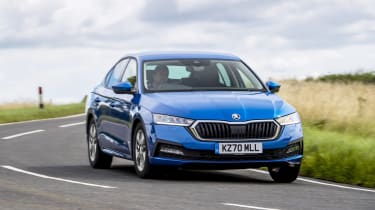
- Price: £27,475
- Engine: 1.5-litre 4cyl, 148bhp
The Octavia is a near-faultless family hatchback. In terms of comfort and cabin quality it’s one of the very best, while no rival comes close for passenger or boot space. It’s great value for money, offering more power than its rivals for similar cash.
Toyota Corolla Icon Tech
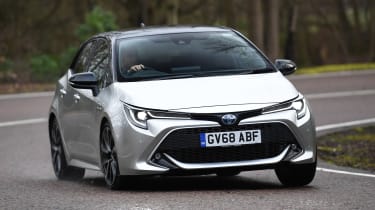
- Price: £28,285
- Engine: 1.8-litre 4cyl hybrid, 120bhp
While you might expect the hybrid Corolla to be impressively frugal – and at up to 62.7mpg, it beats its rivals here with ease – what is more of a surprise is that it’s great to drive, too. A recent update has also introduced a vastly improved infotainment system.
Figures
| Vauxhall Astra GS Line 1.2 Turbo | Ford Focus 1.0 EcoBoost 125 Titanium Vignale | Volkswagen Golf 1.5 TSI 130 Style | |
| On the road price/total as tested | £27,210/£27,810 | £26,950/£28,700 | £27,765/£28,450 |
| Residual value (after 3yrs/36,000) | £13,251/48.7% | £14,100/52.3% | £14,274/51.4% |
| Depreciation | £13,959 | £12,850 | £13,491 |
| Annual tax liability std/higher rate | £1,564/£3,128 | £1,549/£3,098 | £1,596/£3,192 |
| Annual fuel cost (12k/20k miles) | £2,176/£3,627 | £2,293/£3,822 | £2,309/£3,848 |
| Insurance group/quote/VED | 20/£640/£165 | 13/£616/£165 | 18/£608/£165 |
| Cost of 1st/2nd/3rd service | £470 (2 years) | £370 (2 years) | £386 (2 years) |
| Length/wheelbase | 4,374/2,675mm | 4,382/2,700mm | 4,284/2,619mm |
| Height/width | 1,432/1,860mm | 1,475/1,825mm | 1,491/1,789mm |
| Engine | 3cyl inline/1,199cc | 3cyl inline/999cc | 4cyl inline/1,498cc |
| Peak power/revs | 129/5,500 bhp/rpm | 123/6,000 bhp/rpm | 128/5,000 bhp/rpm |
| Peak torque/revs | 170/1,750 Nm/rpm | 170/1,400 Nm/rpm | 200/1,400 Nm/rpm |
| Transmission | 6-speed man/fwd | 6-speed man/fwd | 6-speed man/fwd |
| Fuel tank capacity/spare wheel | 52l/dealer-fit option | 52 litres/space saver | 50 litres/£105 |
| Boot capacity (seats up/down) | 422/1,339 litres | 375/1,354 litres | 381/1,237 litres |
| Kerbweight/payload/towing weight | 1,371/509/1,200kg | 1,330/565/1,100kg | 1,306/496/1,400kg |
| Turning circle | 10.5 metres | 11.0 metres | 10.9 metres |
| Basic warranty (miles)/recovery | 3 yrs (60,000)/1 yr | 3 yrs (60,000)/1 yr | 3 yrs (60,000)/1 yr |
| Driver Power manufacturer/dealer pos. | 19th/N/A | 25th/8th | 18th/10th |
| NCAP: Adult/child/ped./assist/stars | 80/82/67/66/4 (2022) | 85/87/72/75/5 (2018) | 95/89/76/78/5 (2019) |
| 0-62mph/top speed | 9.7* secs/130mph | 10.2 secs/124mph | 9.2 secs/133mph |
| Test economy (mpg/mpl)/range | 47.0/10.3/538 miles | 44.6/9.8/510 miles | 44.3/9.7/487 miles |
| WLTP combined | 48.7mpg | 52.3mpg | 51.4mpg |
| WLTP combined | 10.7mpl | 11.5mpl | 11.3mpl |
| Actual/Claimed CO2/tax bracket | 130/124g/km/29% | 146/123g/km/29% | 132/124g/km/29% |
| Airbags/Isofix/parking sensors/cam. | Yes/yes/f&r/360 | Yes/yes/f&r/£500* | Yes/yes/f&r/£315 |
| Auto box/lane keep/blindspot/AEB | £1,500/yes/no/yes | £1,890**/y/£400/y | £1,920**/yes/yes/yes |
| Climate control/cruise control | Yes/adaptive | Yes/yes | Yes/adaptive |
| Leather/heated seats | No/yes | Artificial/yes | No/yes |
| Met paint/LED lights | £600/yes | £575/yes | £685/yes |
| Keyless entry & go/powered tailgate | Yes/no | Yes/no | £425/no |
| Sat-nav/digital dash | Yes/yes | Yes/yes | Yes/yes |
| DAB/connected services | Yes/yes | Yes/yes | Yes/yes |
| Wireless charging | No | Yes | Yes |
| Apple CarPlay/Android Auto | Yes/yes | Yes/yes | Yes/yes |
